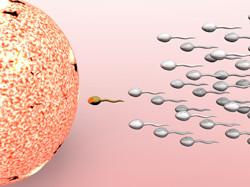Genetics of male infertility
Sperm development in mice and men is affected by epigenetic changes in genes, many of which are on the X and Y sex chromosomes. The 'Epigenetic regulation of the sex chromosomes and male infertility' (EPIGEFXY) project has investigated whether alterations in expression of these genes can contribute to male infertility. Researchers studied a mouse model and focused on two genes known to be involved in the final stage of sperm production, spermiogenesis. Slx and Sly have opposite effects – Slx is an activator of XY gene expression whereas Sly is a repressor. Absence of Sly causes male infertility but this can be compensated for if Slx is also missing. This disturbance of XY gene expression is caused by changes in the epigenetics of the XY DNA material. The evolutionary significance of this genetic situation has been published in the PLoS Genetics journal. Slx and Sly gene products interact with a particular protein, SSTY. EPIGEFXY results show that together with Slx and Sly, this protein is involved in the epigenetic regulation of XY gene expression. The researchers have also identified a further 21 possible proteins that work with the Sly gene that require validation. The EPIGEFXY project has set up a technique using fluorescence-activated cell sorting (FACS) to sort and purify immature sperm-producing cells according to their light-scattering and fluorescent properties. The process has been geared to identify the epigenetic changes associated with various mutations. The long-term aim is to apply this knowledge to the human sperm production process. Assisted reproductive technologies (ARTs) are responsible for up to around 4 % of live births in the EU, depending on the country. Although controversial, there are a number of reports that ARTs may increase the incidence of birth and developmental defects. The firm research platform from EPIGEFXY research is therefore of critical importance in studies on environmental factors that affect male fertility.







